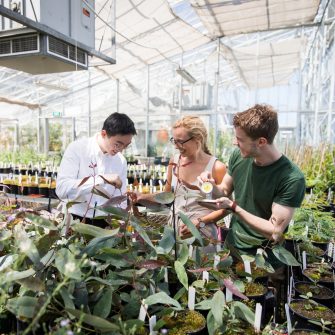Master of Materials Technology
- Commencing Terms
- Term 1, 2 & 3
- Duration
- 2 Year(s)
- Delivery Mode
- Face-to-face (includes blended)
- Campus
-
Kensington
- Codes
- Program code 8717
- CRICOS code 085912A
-
2026 Indicative first year full fee
- $40,000*
-
2026 Indicative full fee to complete degree
- $81,000*
-
2026 Indicative first year full fee
- $60,000*
-
2026 Indicative full fee to complete degree
- $125,000*
Application closures for 2026
International applications for all undergraduate programs, as well as postgraduate programs offered by the faculties of Arts, Design & Architecture, Engineering (excluding Master of Information Technology and associated programs) and Science are now closed to New Overseas Student Commencement (NOSC) for 2026 intakes.
Postgraduate programs offered by the Business School and the faculties of Law & Justice and Medicine & Health remain open. Master of Information Technology (and associated programs) also remain open.
- Overview
- Entry requirements
- What will I study?
- Future careers
- How to apply
- Fees & Scholarships
Overview
Lead the way in building a better future for everyone with a Master of Materials Technology from UNSW. Materials scientists and engineers are working to solve some of the world’s biggest societal challenges. They’re developing more sustainable processes and recyclable products, as well as innovative materials used for green energy generation and storage through to biomedical applications. They build the world we live in, developing high-performance metallic, ceramic, polymeric, composite, nanostructured, and nature-inspired materials, and designing new products and technologies.
UNSW’s Master of Materials Technology (MMatTech) is the leading materials technology postgraduate degree in Australia, offering a wide range of courses in materials science and engineering, from the fundamentals of materials science right through to computational materials science, sustainable materials processing and materials design and performance.
You’ll come away with a deep understanding of the interrelationships between the structure, properties, processing and performance of materials. You’ll gain in-demand skills that will set you up for a career designing advanced materials for use in aerospace, transportation, defence, construction, mining, electronics, energy conversion or biomedical science. The possibilities are endless.
Key features
- Breadth of course offerings
UNSW’s School of Materials Science and Engineering offers one of the foremost masters-level programs in Australia, with the most comprehensive range of courses across the entire spectrum of materials science and engineering.
- Flexible study options
This master’s program offers a very broad selection of elective courses that enables specialisation in a particular discipline of materials science and engineering. This degree also includes a component of experimental or design project work and an original research project of your choice.
- Recognition of prior learning
Recognition of Prior Learning (RPL) may be granted for materials science and engineering subjects studied previously, which can reduce the normal 2-year full-time program to 1.5 years or, in some cases, to 1 year in duration.
- Wide range of career opportunities
The degree provides graduates with outstanding career prospects across various sectors, such as aerospace, transportation, defence, construction, mining, electronics, energy conversion, and biomedical science.
Why study at UNSW?
Ranked #1 in Australia
We’re ranked #1 in Australia for Materials Science and Engineering, according to the 2023 Academic Ranking of World Universities (ARWU) by the Shanghai Ranking Consultancy. UNSW Sciene is ranked #1 in Australia and #27 globally for materials science (QS World University Rankings by Subject, 2025). Our Master of Materials Technology offers the most comprehensive range of courses in materials science and engineering in Australia.
At UNSW’s School of Materials Science and Engineering, you’ll learn from world-leading experts in materials technology and access state-of-the-art computing, materials processing, characterisation and property testing facilities.
Leverage our industry partnerships
UNSW is a global top 20 university (QS World University Rankings, 2024–2026). Develop valuable relationships with local and international enterprises that are leading the way in materials science and engineering, thanks to our partnerships and collaborations with companies like Boral, Cochlear, CSIRO, Hitachi Chemical Limited, BHP, BaoSteel, Chalco, OneSteel, Weir Minerals, and more.
World-class research and development
Breakthroughs are happening every day at UNSW. Our people are making new developments in materials science and engineering, biomedical engineering, and sustainable materials processing at our world-class research centres, hubs and institutes, including:
-
ARC Centre for Excellence in Future Low-Energy Electronics Technologies.
ARC Research Hub for Transforming Waste in Cost Effective Green Manufacturing
ARC Research Hub for Fire Resilience Infrastructure, Assets and Safety Advancements
ARC Research Hub for Zero-Emission Power Generation for Carbon Neutrality
ARC Research Hub for Smart Process Design and Control
ARC Training Centre for Innovative Composites for Sustainable Mining Equipment
ARC Training Centre for Battery Recycling
Want to see more from UNSW Science?
Entry requirements
For entry into this degree, you must have one of the following:
- a four-year bachelor’s degree with a minimum weighted average mark (WAM) of 65 in a cognate science or engineering discipline (e.g., materials science and engineering, chemistry, chemical engineering, mineral engineering and mechanical engineering)
- a bachelor’s degree with a minimum weighted average mark (WAM) of 50-65 in a cognate science or engineering discipline and approximately five years’ professional experience in a relevant field such as in the materials processing or testing industry
- an honours degree at a recognised university
- a graduate certificate or graduate diploma in the materials sciences with a minimum WAM of 65.
Applicants with other relevant qualifications and experience not listed above may apply for admission to this program. You will need to demonstrate that you have achieved the same knowledge and skills through your formal or informal learning as the qualifications listed for entry into this program.
Those applying for admission from a cognate field and/or with an honours degree may receive Recognised Prior Learning (RPL). Those entering from a non-cognate bachelor’s degree or other degrees will only be eligible for credit where it is directly relevant to materials technology.
English language requirements
You may be asked to provide evidence of your English proficiency to study at UNSW depending on whether you are from an English-speaking background or non-English speaking background. English language skills are vitally important for coping with lectures, tutorials, assignments and examinations - this is why UNSW requires a minimum English language competency for enrolment.
If English is not your first language, you’ll need to provide proof of your English proficiency before you can be given an offer to study at UNSW. You can do this by providing evidence that you meet one or more of the following criteria:
- English language tests and university English courses
- Prior study in the medium of English
- Other qualifications
If you need to improve your English skills before you start your degree, UNSW College’s Academic English Programs are for you. The programs are suitable for various English levels and help you prepare for university studies and life in Australia.
For more details, visit the English Language Requirements page.
Check the specific English language requirements for this program
What will I study?
UNSW is introducing a new academic calendar from 2028.
We are moving to a new flex-semester calendar. What does this mean for your studies?
Program structure
Advance your understanding of the major classes of materials, and how these materials can be transformed into eco-friendly products through sustainable manufacturing processes. With a wide range of courses, you can tailor your degree to your interests, and equip yourself with the specialist knowledge and skills for a career in materials technology that makes an impact.
Full program structure
The Master of Materials Technology can be completed in one to two years of full-time study. Recognition of Prior Learning (RPL) may be granted for materials science and engineering courses studied previously, which can reduce the normal 2-year full-time program to 1.5 years or, in some cases, to 1 year in duration.
The program is made up of 12 courses, including 4 core disciplinary courses and 8 courses selected from 20 electives. As part of your coursework, you’ll also undertake experimental or design project work and an original research project of your choice.
-
You must take MATS6114 Research Project A twice and MATS6113 Research Project once to satisfy the research component of this program.
-
You’ll choose eight courses from the following list of electives.
- Engineering in Process Metallurgy
- Phase Transformations
- Process Metallurgy Advanced
- Fracture Mechanics and Failure Analysis
- Polymer Science and Engineering 2
- Recycling of Materials
- Sustainable Materials Engineering
- Advanced Functional Materials
- Advanced Alloys
- Thermodynamics and Phase Equilibria
- Kinetics and Phase Transformations
- Physical Properties of Materials
- Chemical Properties of Materials
- Mechanical Properties of Materials
- Thermal Properties of Ceramics
- Functional Properties of Materials
- Polymer Materials Science
- Computational Materials Science
- Processes in Materials Engineering
- Characterisation of Materials
Future careers
A Master of Materials Technology could take you anywhere. Graduates are in demand in Australia and around the world, working in a wide range of roles across diverse industries, from aerospace to biomedical engineering.
Materials technology is also a field that’s constantly evolving, as the demand for better materials and more sustainable processes grows.
This means new opportunities for materials scientists and engineers are always emerging. Here are just some of the careers in materials technology today:
Materials Scientist: Conduct research and development to discover new materials or improve existing materials that positively impact the world around us.
Materials Engineer: Develop environmentally friendly materials and processes, such as recyclable or biodegradable materials, to reduce the environmental impact of various industries.
Polymer Scientist: Develop and synthesise new polymeric materials or improve existing ones for structural and functional applications.
Biomaterials Engineer: Design and develop materials that interact with biological systems, such as implants, prosthetics, and drug delivery systems.
Metallurgical Engineer: Specialise in the sustainable production, processing, and properties of metals and alloys.
Ceramic Engineer: Design and manufacture advanced ceramic materials for various applications such as electronics, construction, and aerospace.
Materials Failure Specialist: Investigate material failures and determine the root causes to prevent future occurrences.
Semiconductor Scientist: Specialise in materials used in the production of microchips and electronic devices, working on improving performance, miniaturisation, and energy efficiency.
Renewable Energy Technologist: Design and optimise materials for energy storage applications, such as batteries and fuel cells.
Aerospace Materials Engineer: Design and optimise materials for use in aircraft and spacecraft, focusing on properties like strength, weight, and resistance to extreme environments.
Forensic Materials Scientist: Analyse and identify materials used in criminal investigations, such as trace evidence, such as fibres, paints, and glass, found at crime scenes.
Our alumni
“As a postgraduate student, the coursework in the material field taught me a lot of advanced scientific technology. The various assessments evaluate the students from different aspects, such as individual effort, team cooperation and oral presentation. Due to these assessments, my capability has been dramatically improved. I learnt to browse information online more comprehensively, to work as a team more efficiently, and also to present a speech in public more logically and confidently. I really appreciate my experience at UNSW, which will bring me a huge triumph in my life, and I will strongly encourage any potential researchers to join UNSW and achieve your goals.”
Runkai Liu
PhD Candidate
“The courses offered by UNSW Materials Science & Engineering are in line with the mainstream market, and the knowledge you have learned will be of great help in your job search.”
Robin Zhang
Master of Materials Science 2021, UNSW
Optical Engineer, Molex
“The School of Materials Science and Engineering at UNSW is a high-quality and world-class education. It provided me with the newest academic study and advanced equipment to support your idea to become a reality.”
Rocco Yang
Master of Materials Technology 2020
Process Engineer, Intel
How to apply
Applications must be submitted through our Apply Online portal. We encourage you to submit your completed application as early as possible to ensure it will be processed in time for your preferred term. Some high-demand programs and Faculties with limited places may have an earlier application deadline or commencement date. Find out more.
Ready to start your application?
For most international students, applications are submitted via our Apply Online service. We encourage you to submit your completed application as early as possible to ensure it will be processed in time for your preferred term.
Some high-demand programs with limited places, may have an earlier application deadline or may have an earlier commencement date. For details, visit the international admissions information page.
Ready to start your application?
Fees & Scholarships
*Fees are subject to annual review (or when required) by the University and may vary accordingly.
Indicative fees are a guide only and have been calculated based on the typical enrolment patterns of students undertaking the program. The indicative fees listed here is an estimate for tuition only and excludes non-tuition fees and charges. The amount you pay will vary depending on the calendar year of enrolment, the courses you select and whether your study load is more or less than 1 Equivalent Full Time Student Load (48 units of credit (UOC) per year).
You should not rely on indicative fees as fee increases are assessed when required and may exceed the indicative figures listed here. Actual fees are calculated on enrolment. More information on fees can be found at the UNSW fees website.
*Fees are subject to annual review by the University and may increase annually, with the new fees effective from the start of each calendar year. The indicative fees listed here are based on an estimated average and are for tuition only, other fees and charges are not included. The amount you pay will vary depending on the calendar year to enrol, the courses you select and whether your study load is more or less than 1 Equivalent Full Time Student Load (8 courses per year).
Indicative fees are a guide for comparison only based on current conditions and available data. You should not rely on indicative fees. More information on fees can be found at the UNSW fees website.
Indicative fees to complete the program have been calculated based on a percentage increase for every year of the program. Fee increases are assessed annually and may exceed the indicative figures listed here.
Indicative fees to complete the program include tuition plus an estimate of study-related costs of approximately $1,000 per year. To find out more about other costs, visit UNSW International.
Scholarships
At UNSW, we award over $83 million in scholarships each year. We pride ourselves on rewarding excellence and making university accessible to students from all walks of life. Whether you’re a domestic or international student, our range of scholarships, prizes and awards can support your journey.
Progress starts here – at a world-leading university

Top 20 Worldwide
UNSW is ranked #20 university in the world
QS World University Rankings, 2024–2026

Most Employable Graduates
Winner of the AFR Most Employable University Award seven years in a row
AFR Top100 Future Leaders Awards, 2020–2026

Australia's #1 for Innovation
Highest number of startups and spinouts from university-developed tech
SCOPR report, 2024






